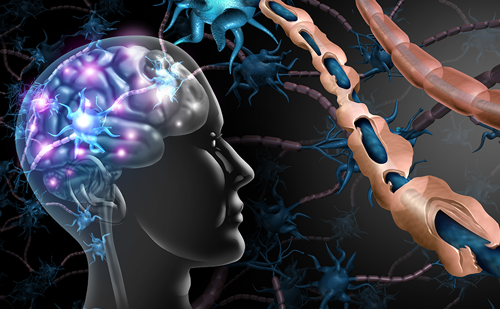Therapeutic use of the Arts for Patients with Multiple Sclerosis
Abstract
Overview
People with multiple sclerosis (MS) face a wide variety of physical, emotional, and social challenges. A multidisciplinary comprehensive care approach is recommended for the management of MS and its consequences, and non-traditional treatments are increasingly considered by patients and health care providers, particularly for the promotion of wellness in the context of this chronic disease. Previous research has demonstrated the benefits of the therapeutic arts (art therapy, dance and movement therapy, and music therapy) in addressing some of the physiological, psychological, cognitive, social, and spiritual needs of patients facing a variety of chronic illnesses. Our
review of the literature suggests that therapeutic art can be beneficial to individuals with MS, particularly in promoting self-efficacy, emotional well-being, and motor control. However, the body of evidence is limited, and further research is needed regarding the outcomes and mechanism
of action of therapeutic arts in MS to better understand their role in the management of the consequences of the disease.
Keywords
Music therapy, art therapy, dance therapy, multiple sclerosis
Article Information
Disclosure
Lisa Gallagher and Francois Bethoux have nothing to disclose in relation to this article. No funding was received in the publication of this article.
Authorship: All named authors meet the International Committee of Medical Journal Editors (ICMJE) criteria for authorship of this manuscript, take responsibility for the integrity of the work as a whole, and have given final approval to the version to be published.
Correspondence
Lisa M Gallagher, Cleveland Clinic Arts & Medicine Institute, 1950 Richmond Rd/TR308, Lyndhurst, OH 44124, US. E: gallagl@ccf.org
Access
This article is published under the Creative Commons Attribution Noncommercial License, which permits any noncommercial use, distribution, adaptation, and reproduction provided the original author(s) and source are given appropriate credit.
Received
2017-06-03T00:00:00

Trending Topic
Diabetic striatopathy (DS) is a rare hyperglycaemic condition associated with one or both of the following criteria: (1) acute-onset chorea–ballism (random, flowing and nonsuppressible involuntary movements) and (2) striatal hyperdensity on computed tomography (CT) scan or T1-weighted magnetic resonance imaging (MRI).1,2 DS is generally considered a complication of poorly controlled non-ketotic hyperglycaemia with acute hyperglycaemic surge, although […]
Related Content in Multiple Sclerosis

Multiple sclerosis (MS) is a complex disease that can pose significant challenges in diagnosis, monitoring and treatment. Over the years, the quest for more precise and accessible diagnostic tools has led to the exploration of different fluid biomarkers in cerebrospinal ...

In the latest edition of touchREVIEWS in Neurology, we are pleased to present a collection of insightful articles that highlight the current landscape and future directions in neurological research and treatment. Firstly, Rajvinder Karda opens this issue with a compelling ...

Multiple sclerosis (MS) is a chronic, immune-mediated disorder of the central nervous system characterized by inflammation, demyelination and neurodegeneration. Natalizumab is a widely used anti-α4 integrin inhibitor for treating highly active MS. In the pivotal trials of natalizumab for MS, ...

Acute disseminated encephalomyelitis (ADEM), first characterized in 1931,1 is a non-specific clinical syndrome of polyfocal central nervous system (CNS) inflammatory demyelination; it is characterized by encephalopathy and large, poorly demarcated cerebral white matter lesions.2,3 Myelin oligodendrocyte glycoprotein (MOG) antibody-associated disease (MOGAD), ...

Over the past two decades, monoclonal antibodies targeting the surface antigen CD20 have emerged as highly effective disease-modifying therapies (DMTs) for multiple sclerosis (MS).1 The major mechanism of action of these therapies is via B-cell depletion, as CD20 is expressed ...

Disease-modifying therapies (DMTs) have brought about substantial improvements to the lives of people with multiple sclerosis (MS).1–3 However, MS remains a chronic disease with a variable course and symptoms, representing a substantial challenge to quality of life.2,3 MS management requires ...

Although disease-modifying therapies have been the primary focus of multiple sclerosis (MS) treatment during the past two decades, there is increasing awareness of the importance of treating patients holistically, paying attention to functional comorbidities and addressing mood and cognition. In ...

Multiple sclerosis (MS) is an immune-mediated neurodegenerative disease affecting approximately 2.5 million individuals worldwide.1,2 Pathologically, MS is mostly characterized by inflammation, demyelination, axonal degeneration and gliosis. Clinically, a wide range of symptoms can occur, including cognitive, motor and sensory impairments.3 The ...

Paediatric-onset multiple sclerosis (POMS) is the symptom onset and diagnosis of multiple sclerosis (MS) before the age of 18.1 Diagnostic criteria were revised by the International Pediatric MS Study Group in 2013. Compared to patients with adult-onset MS (AOMS), young patients are ...

Multiple sclerosis (MS) is a chronic neurological disease that is associated with high rates of depression and anxiety,1 particularly in the early stages of diagnosis.2,3 A growing body of evidence suggests that cognitive behavioural therapy (CBT) is an effective treatment ...

Neurologic manifestations in systemic sclerosis are rare, occurring in 0.8–5.6% of patients. Peripheral neuropathy is one of the most common neurologic abnormalities, with central nervous system involvement reported less frequently.1 Central nervous system (CNS) manifestation has been described in a few ...
Latest articles videos and clinical updates - straight to your inbox
Log into your Touch Account
Earn and track your CME credits on the go, save articles for later, and follow the latest congress coverage.
Register now for FREE Access
Register for free to hear about the latest expert-led education, peer-reviewed articles, conference highlights, and innovative CME activities.
Sign up with an Email
Or use a Social Account.
This Functionality is for
Members Only
Explore the latest in medical education and stay current in your field. Create a free account to track your learning.


